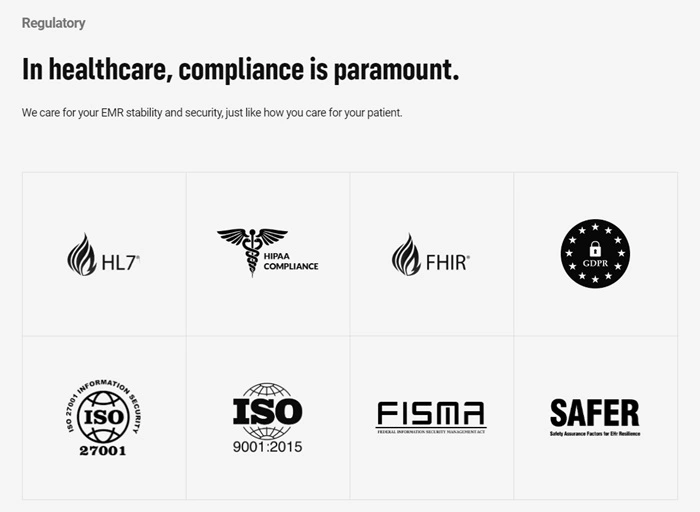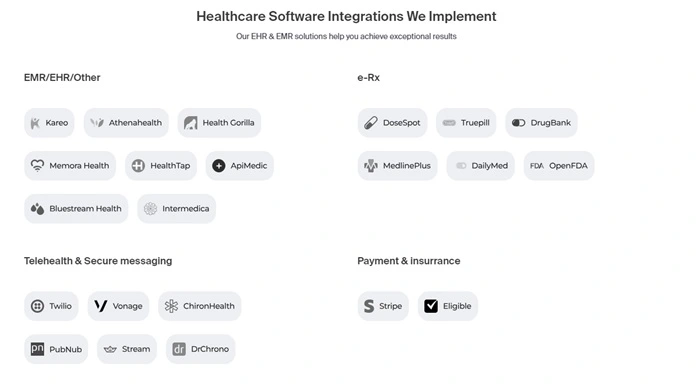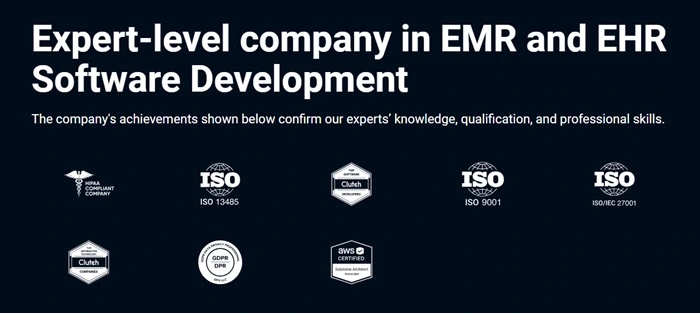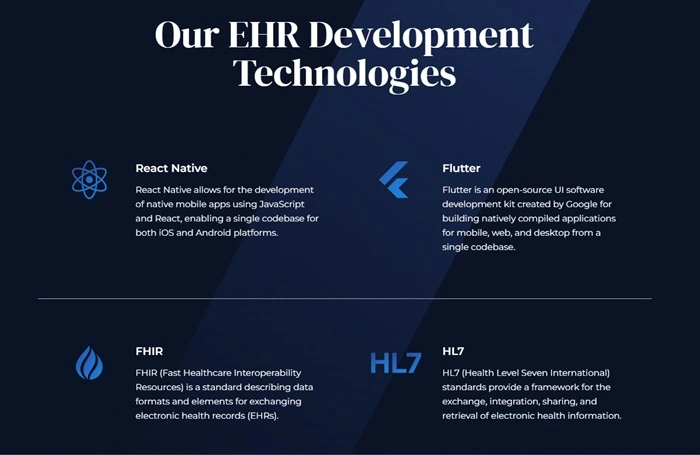Review of EHR and EMR software development company for small to large facilities
To create this list of EMR/EHR software development companies, we gathered real client reviews of their work and information from their website and Clutch to best describe them.
Keep in mind there isn’t the best vendor, as these companies have their own domain. The key is to find someone that matches what you need.
| Company | Focus | Team size | Price | Clutch rate |
|---|---|---|---|---|
| Synodus | Cost-effective EMR/ EHR | 250 | $25/hr | 5/5 |
| Empeek | Highly customed EMR/EHR | 100 | $25/hr | 5/5 |
| Andersen | Agile EMR/EHR development | 3500 | $50/hr | 4.9/5 |
| Binariks | EHR for large facilities | 180 | $50/hr | 4.9/5 |
| Scopic | Highly customed EMR/EHR | 280 | $50/hr | 4.9/5 |
| Thinkitive | EMR for small facilities | 300 | $25/hr | 5/5 |
| Narola | Advance EHR/EMR | 350 | $25/hr | 4.9/5 |
| iTransition | Secure EMR/EHR solution | 3000 | $50/hr | 5/5 |
| Effectivesoft | EMR/EHR consulting | 365 | $50/hr | 4.9/5 |
| Flatirons | Cloud EHR development | 40 | $50/hr | 5/5 |
1. Synodus
With 250+ well-versed developers, Synodus is currently APAC’s leading EHR and EMR software development company. For the last 5 years, they have worked with 10,000 healthcare staff from large facilities in Vietnam, Singapore, Malaysia, Philippines, etc, and small practitioners worldwide.
Here’s what you can build with Synodus:
- EHR/EMR development from scratch.
- Customize EMR/EHR components.
- Legacy modernization for EHR and EMR.
- EMR integration.
But that’s not all. Synodus covers everything from standard features to advanced ones, including data analytics, finance management, and patient mobile apps.

What past clients love about them:
Cost-effectiveness is what all 31 facilities that have worked with Synodus loved. The team can save up to 63% of development cost, and 2x affordable compared to some companies on this list by:
- Using a packaged solution to only focus on customization (not building from scratch).
- Synodus combines a T&M and fixed price model to create a win-win partnership. You can flexibly scale the team, and Synodus ensures the final quality. They take all the risks if they do not deliver as expected.
Moreover, their deep understanding of the healthcare landscape of APAC instills trust in their past clients. They know how to build a good UI/UX to the local preference, work around regulations, and even consider religious favor.
What past clients think they can do better:
Their development center is in Vietnam, which can cause time zone barriers when working with US and EU clients. You can ask them for the follow-the-sun model to ensure this is not a big problem.
Ready to build an EMR or EHR that scales, secures, and fits your budget?
2. Binariks
Serving many of the top 1000 global companies across industries, Binariks is trusted by many SMEs and enterprises.
For healthcare, their team is most skilled in EHR development for large facilities, with a high focus on interoperability, agility, and security. Complying with HIPAA and FHIR, the team covers anything from basic features to advanced modules such as AI chatbot, predictive analytics, and e-prescription.
Here’s what you can request:
- Fully-cycle EHR and EMR development services.
- Add new function to existing EHR/EMR.
- Re-engineering and scaling legacy EHR systems.
- HIPAA compliance consulting.
- EMR/EHR testing.
- White label EHR software development services.
Other notes:
- Office location: USA, Poland, Ukraine, Estonia.
- What past clients love about them: Many are surprised by Binarisk’s deep understanding of the healthcare industry. This EHR software development company is slowly becoming an established name in the market. Besides that, their proactive problem solving, and client-centric mindset are also adored.
- What past clients think they can do better: Some suggest the team should take quality assurance into account more seriously to minimize bugs and system crashes. Others reported specific slow sprints mid-development process, requiring them to push the team constantly.
3. Empeek
Unlike other companies on this list, Empeek solely focuses on serving the healthcare industry for more than 7 years, working with startups to enterprises for diverse needs.
When building EHR and EMR, their lucrative engineers aim to build highly customized solutions for unique facilities and processes. Relationship-based collaboration and a consistent approach are other core principles of Empeek.
They offer basic features for patients and physicians to advance modules:
- Ready-to-go EHR/EMR solutions.
- Custom EHR/EMR development from scratch.

Other notes:
- Security compliance: HIPAA, HL7, HITECH, GDPR, CDA, FDA.
- Office location: USA.
- What past clients love about them: With 15 reviews on Clutch, most praise Empeek for effective project management and accurate cost estimates. They also deliver great industry-specific solution thanks to a deep focus on healthcare.
- What past clients think they can do better: UX/UI design should be improved.
4. EffectiveSoft
Founded in 2003 with 365 in-house experts and 1835 projects in diverse business domains, EffectiveSoft provides healthcare platform development, including EMR/EHR systems that help eliminate paper records.
With such dedication, the team built close relationships and instilled trust in customers, being recognized by Clutch as a top IT consulting company in the medical field.
EffectiveSoft’s offer:
- Custom EHR and EMR from scratch.
- Custom EMR components.
- EMR/EHR integration with third-party.
- Healthcare consultation.
Other notes:
- Office location: USA, UAE, Poland.
- Security compliance: HIPAA, GDPR, HL7, ISO/IEC 27001:2013, PHI policy.
- What past clients love about them: Being feedbacked as a reliable partner, EffectiveSoft can seamlessly integrate with the client team for staff augmentation. You can also scale your team up and down fast, without any complexity.
- What past clients think they can do better: The team should offer a more effective and flexible pricing model. If this is what you’re looking for, discuss with them firsthand to clear out any fog and make the most suitable payment option for your budget.
5. Andersen
For the last 17 years, Andersen has provided custom solutions across industries and businesses. Their team worked with facilities from the USA, Europe, and the Middle East to deliver more than 10 successful EMR/EHR projects.
Andersen possesses extensive expert knowledge, qualifications, and professional skills. Here’s what they offer:
- Custom EHR/EMR software development.
- EMR/EHR modernization by adding new features and upgrading the system.
- EHR/EMR integration.

Other notes:
- Office location: Poland, Germany, USA, UK, UAE, Kazakhstan.
- What past clients love about them: Expertise in Agile adoption is the highlight of Andersen’s service. Other than that, many clients appreciate their timely deliveries and expertise in software development.
- What past clients think they can do better: Many suggest their communication lacks transparency. At the same time, their experience in healthcare and EMR/EHR (with only 10 successful projects) is not as strong as that in other industries, such as financial services.
6. Scopic
You can rely on Scopic for HIPAA—and GDPR-compliant EHR software that bridges effective communication between medical professionals. Scopic solutions are customizable, scalable, and equipped with various features and integrations, aiming for a connected healthcare system with the EHR’s data flow.
At Scopic, the team mainly focuses on tailoring the EHR from scratch, making sure it best fits your business needs and internal processes.
Other notes:
- Office location: USA.
- What past clients love about them: Scopic has decent customization ability, thanks to its thorough business analysis to understand the project scope during the initial phase. Moreover, many praised them for effective project management, which helped them reach the deadline and optimize the budget.
- What past clients think they can do better: While many claimed that their pricing is reasonable, others complained about pricing being unclear or changed mid-development. You should transparently communicate with Scopic on this before signing anything.
7. Thinkitive
Thinkitive is an IT outsourcing company specializing in creating custom healthcare solutions. With over 9 years of experience, they have delivered 50+ technological solutions to address various healthcare challenges. Their EMR experiences are impressive, with 20 projects done for HIPAA-compliant EMR since 2015.
The team mainly works on EMR, making them a reliable partner for small to midsize facilities, from primary care to psychology centers. They stand out with a wide range of third-party integrations with e-prescription tools, finance systems, and communication software.
Here’re the types of services this EMR software development company provides:
- Staff augmentation for EMR developers.
- Custom EMR Development.
- White Label EMR.
Other notes:
- Office location: USA.
- What past clients love about them: Thanks to the seamless use of the agile methodology, they received positive feedback on project management and communication skills.
8. iTransition
Having completed over 150 healthcare projects, this EHR/ EMR software development company is a complete package for solo practitioners and medical organizations. Their developers aim to build EHR/EMR with an intuitive user interface and essential features that support in providing the best patient care.
Here’s what iTransition can do:
- EHR consultation.
- Full-cycle EHR/EMR custom development.
- EHR integration.
- EHR implementation in on-premises, private, public, or hybrid cloud environments.
iTransition not only complies with rigorous HIPAA, GDPR, OWASP, and other data security regulations, but they are also familiar with ONC-ATCB, FHIR, DICOM, and EuroRec requirements.
Other notes:
- Office location: USA, UK, Poland, UAE, Mexico, Uzbekistan.
- What past clients love about them: iTransition relies on a client-centric approach. The team constantly works for on-time delivery, transparent communication, and reliable technical expertise.
- What past clients think they can do better: Despite having offices present in many English-speaking countries, their development centers, on the other hand, are from non-English-speaking regions. This can create specific language barriers when directly working with developers. ITransition also works with various industries and healthcare might not be their best domain.
9. Flatirons
As a top web and mobile app development company for the healthcare industry, Flatirons serves startups, SMEs, and even large facilities worldwide. The team focuses on creating user-friendly applications, advanced HealthTech features, and all-in-one integration to enhance data interoperability.
Their engagement model includes:
- Project outsourcing for development from scratch.
- Staff augmentation.
Unlike other EHR and EMR software development companies on this list, Flatirons only deals with EHRs; thus, they must ensure that every system complies with HL7 and FHIR.

Other notes:
- Office location: USA
- What past clients love about them: The team’s skills in Cloud, Web app, and SaaS development make them stand out. Many clients from the healthcare industry are satisfied with their Cloud proposal, thanks to its scalability and robust data processing.
- What past clients think they can do better: If you are looking for an on-premises EHR development and modernization, Flatirons still has a lot to prove in this domain. Additionally, with small team size, the team might not be a fit for large-scale projects.
10. Narola Infotech
For the past 18 years, Narola has been a global IT solution provider serving over 1500 corporations in 50 countries. In healthcare development, the team builds EHR and EMR with automation, real-time data analytics, and interoperability.
Other than standard EMR/EHR features, you can ask for a clinical decision support system (CDSS), telehealth integration, and a secure messaging system. At the same time, here’re their cooperation models:
- Fixed price for small projects.
- Dedicated hiring model for long-term projects.
- Time and material for unclear project’s scope.
Other notes:
- Security compliance: HIPAA.
- Office location: USA, India.
- What past clients love about them: Their efficiency is the highlight of their service, as the team is constantly praised for on-time delivery. They also have high adaptability in dealing with changing scopes and requirements, which many clients adore.
- What past clients think they can do better: Despite offering EMR and EHR development services, healthcare is not Narola’s best domain. The team is more well-versed in fintech, real estate, and e-commerce.
Tips on choosing a partner: How to make sure they deliver?
When looking for and picking out a EMR software development company, make sure you get a look on:
- Their proven exposure to Healthcare and EMR/EHR.
- Their ability to deliver.
- Their work and partnership approach.
Let’s break it down
Their proven exposure to Healthcare and EMR/EHR
Experience in Healthcare and EMR: Find a partner that has worked on relevant projects. This proves that they can understand your expectations from the system and know how to handle doctors’ needs.
Regulatory compliance expertise: Healthcare is a highly regulated industry. Most healthcare products must follow data privacy regulations such as HIPAA (in the U.S), GDPR (in Europe), or other relevant standards. You need to check if your EMR software development company is aware of them and know how to employ it in the system.
Practical tips:
- Review the company’s portfolio to assess the number, quality, and scope of their previous projects
- Look through their testimonials on Clutch, G2, or relevant sites for more reliable information.
- Ask them about regulatory compliance to see how deeply they understand it.
Learn about their ability to deliver
Team size: An EHR/EMR software development company with resourceful talent pool can ensure scalability and stability during development. Besides, if they have more middle to senior developers than juniors, it can be a sign of them handling complex systems (such as EHR) better.
Customization ability: A decent EMR software development company should be able to build a system align with your process and create features that truly enhance your operation.
Security and Data Protection: You need a partner that prioritizes taking data protection measures. This makes sure your data migration is stable, secure, and bulletproof from cyberattacks with the highest interoperability.
Focus on User Experience: Doctors, administration staff, and even patients, are the end-users of your EMR/EHR. Their common? They are non-tech people and come from all demographics. So, make sure your design is friendly, easy to navigate and intuitive. Companies with UX/UI designers are the best for this task.
Practical tips:
- Learn about their team through LinkedIn and website.
- Check their POC to see if the proposed solution matches the expected UI/UX, security and customization level.
- Check with their past clients on project quality and security level.
- Inquire about their past projects to see if it matches user experience, data requirements and EHR/EMR architecture.
Their work and partnership approach
Partnership and Collaboration: Building customized EMR is not just a one-time transaction, it is a whole process of joint effort, continuous communication, and partnership between the vendor and the client. Therefore, you should choose a company that values long-term partnership, understands your long-term goals, and is committed to helping you achieve them.
Balance between cost and quality: A partner with a cost-effective mindset can ensure your project stays on budget and delivers good quality. Look into that company’s pricing and make sure that they include a clear and transparent pricing structure that covers development, implementation, and ongoing support.
Practical tips:
At Synodus, we employ a hybrid pricing model. During the initial phase, you pay developers for their time and effort (T&M) to bring more flexibility. Moving onto the development, we use a fixed budget to control deadlines and quality.
If we don’t deliver as expected, the risk is on us. You don’t have to pay for the extra time it takes to fix the system.
Many companies only rely on T&M, which can lead to delays and cost overruns if the team isn’t managed properly. Our model is better at controlling the outcome as it creates a balance risk-taking between two teams.
Challenges of custom EHR/EMR that should be addressed
Many facilities quickly cross custom EHR/EMR out of the list. They are skeptical that the process is too complex to handle, too challenging to maintain, or too costly to build. This isn’t always true. The process will be much easier to handle with the right approach.
Let’s break down these misconceptions.
Complexity of integration
Customizing EHR/EMR systems includes integrating various healthcare systems, devices, and data sources. Everything will be fine if all your systems are cloud-based with an Open API. But it suddenly gets complicated once a legacy system is added to the mix.
Each system has a different architecture, and the data set it collects, making the whole integration process complex and time-consuming.
Debunk: Integration is indeed a headache. But it happens to all the best software, whether custom or SaaS and not just in EMR/ EHR. The key is to find a vendor with integration support and create a flexible architecture that can be adaptive to both legacy and future systems.
Data migration and interoperability
Once integrated with the existing health system, the customized EHR/EMR system must ensure safe and secure data migration and interoperability.
However, most staff consider exporting and transferring data from paper-based to digitalized records a logistical nightmare. Healthcare administrators must list numerous documents detailing the medical histories of many patients. The improper data transfer and lack of interoperability can disrupt patient care and medical assistance procedures.
Debunk: While the process is a big turn-off at the start, it’s beneficial in the long run. When you want to upgrade or switch to a new EMR/ EHR, you don’t need that much time to clarify every document and report again.
Cost and resource allocation
Customized EMR/EHR application can be pricey to use and implement. During the post-deployment, you must also invest in ongoing maintenance, updates, and support. Additionally, budget for IT infrastructure and hiring someone to manage the system is required.
Debunk: Surprisingly, a report comparing the TCO of SaaS EHR and custom EHR after 5 years found that SaaS, which is more affordable at first, becomes expensive in the long run.
SaaS gives you an illusion of being cheap, but after adding in the monthly fee and hidden costs, its TCO is increasingly huge compared to its ROI.
Time constraints
Other than cost, customizing an EHR and EMR is also considered lengthy. While this is true, the bright side is that you can have a system tailored to your exact needs and unique process.
Debunk: Nevertheless, with many technologies and new development strategies today, this challenge can be minimized.
For example, at Synodus, we use a packaged EMR/EHR solution that is a combination of SaaS and custom-built. We give you a set of pre-built features that can be directly used to solve simple tasks. Then, we add customization parts to make it fit your facility. Using this approach, an EMR project that is supposed to be a year-long can be reduced to only four months.
User training
Every integration of new technology must come with staff training. However, not every staff member is willing to learn about it as they believe the old system works fine and changes are unnecessary. Moreover, illogical training time can backfire on the plan and hinder the patient care process.
Debunk: The key is to implement a change management strategy, where you explain to the staff the need to change and what benefits EMR software development can bring.
Wrapping up
With the list of the top EHR and EMR software development companies, we hope you can find a suitable partner. Make sure you use our tips and tricks while making decisions. A good partner is one with technical expertise, experience with healthcare, good communication, clear process, and striving for a win-win partnership.
How useful was this post?
Click on a star to rate it!
Average rating / 5. Vote count:
No votes so far! Be the first to rate this post.




